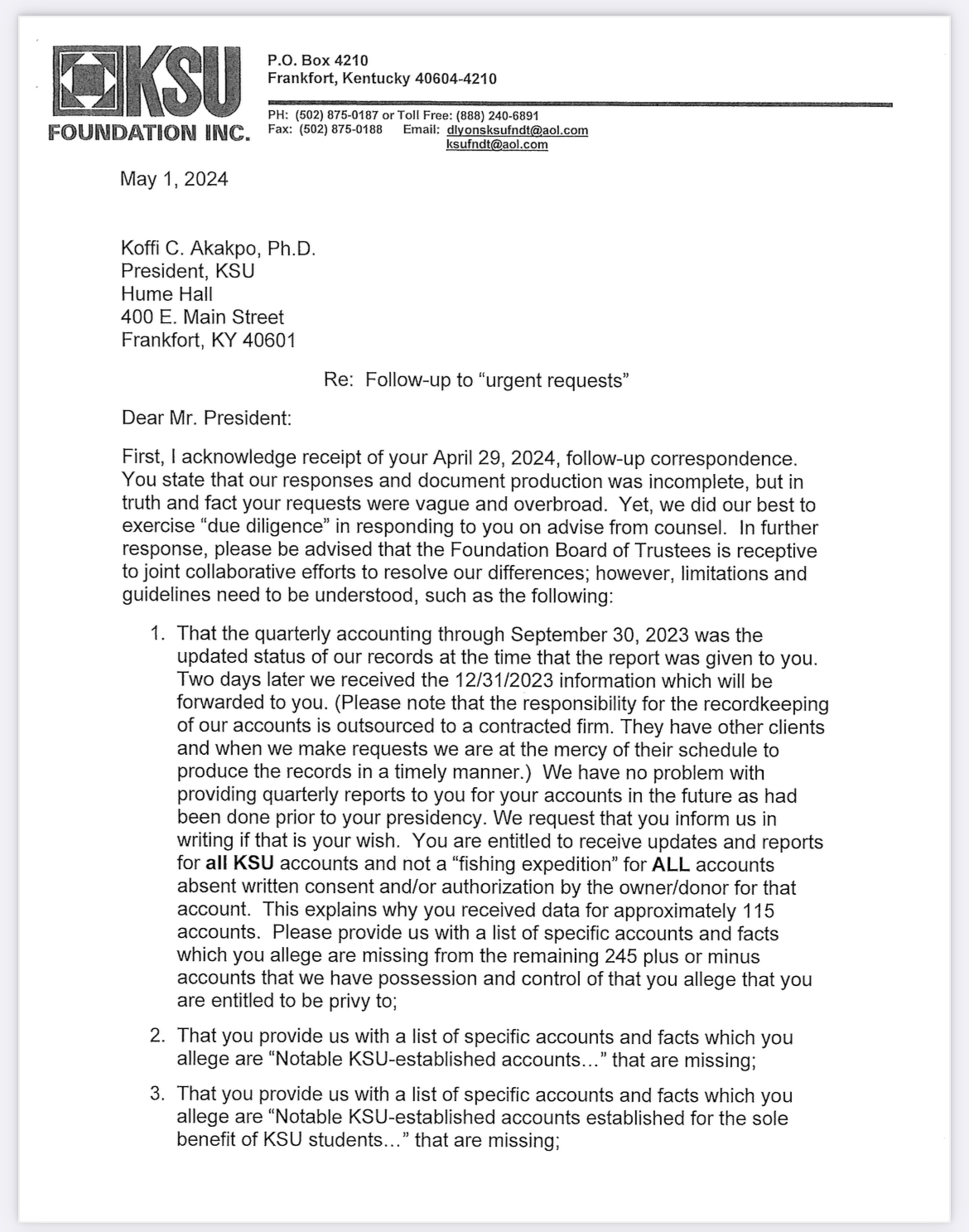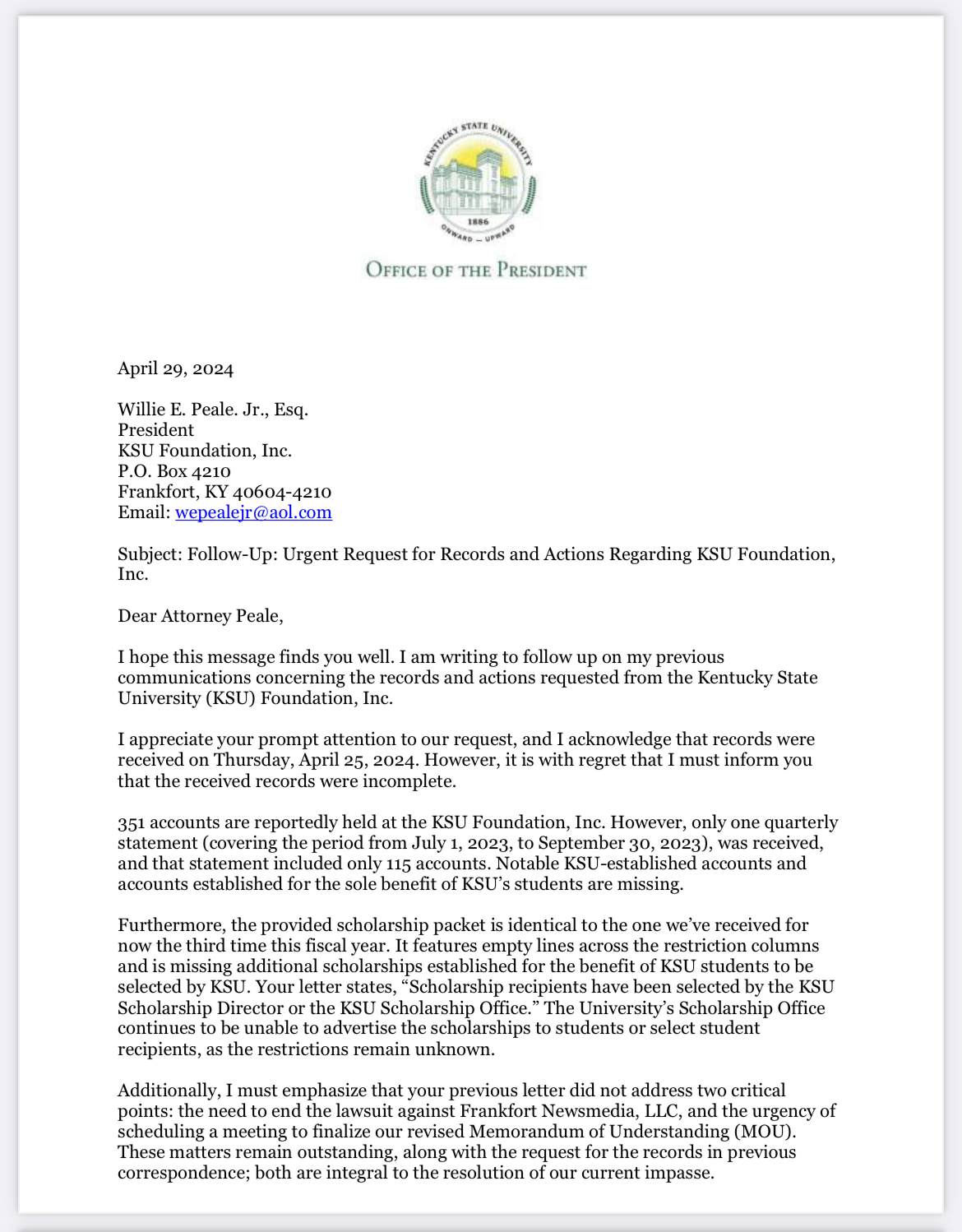

The "war of words" between Kentucky State University and the Kentucky State University Foundation -- that has drawn criticism from its alumni association -- continues.
In an article published on May 9, the State Journal reported on the foundation's May 1 response to KSU President Koffi Akakpo April 29 letter to it. In his April 29 letter for the university, Akakpo identified omissions in the foundation's financial accounting to the university to date, requested additional documentation, and noted the foundation's failure to address the ongoing open records litigation with the State Journal. Details of Akakpo's requests are omitted here for purposes of brevity.
https://www.state-journal.com/education/ksuf-to-k-state-president-pleas…
This tense exchange between university and foundation is contemporaneous with the KSU Board of Regents' recent letter to the KSU community and supporters in which the board explained the deficiencies in financial reporting that led to the apparent relationship "freeze."
https://kyopengov.org/blog/kentucky-state-university-freezes-its-relati…
Writing on behalf of the foundation, Chairman Willie Peale criticized the university's tone:
"In the future, please cease your admonitions to the foundation’s Board of Trustees because we are experienced and accomplished professionals in various fields.
“We moreso are just as sincere as you and your Board of Regents because our board consists of 95% alumni and a graduate of another HBCU (historically Black college and university). It is recommended that the paternal approach and attitude exemplified in prior requests has to be discarded if we are to make progress towards solutions resolving our present disputes."
https://kyopengov.org/blog/state-journal-files-response-opposing-ksu-fo…
Characterizing the university's earlier requests as "vague and overbroad," the foundation defended its track record on financial transparency vis-a-vis the university, agreed to furnish "quarterly reports [of KSU accounts] to you for your accounts in the future as had been done prior to your presidency" upon written request, but objected to "'fishing expeditions' of ALL [foundation] accounts." (Emphasis in original.)
The foundation took particular umbrage at the university's suggestion that it discontinue open records litigation against The State Journal. To date, that litigation has been decided in favor of the newspaper and the public's right of access to nonexempt foundation records. This notion seems particularly abhorrent to the foundation notwithstanding the fact it was declared a public agency, subject to the open records law, by the Kentucky Supreme Court in 1992.
https://casetext.com/case/ky-state-univ-found-v-frankfort-newsmedia-llc
https://casetext.com/case/frankfort-pub-v-kentucky-st-un-found
The foundation demanded that the university "provide the rationale and/or source of your authorization to request that we -- the Foundation, cease litigation of our own Board's choice with Frankfort Newsmedia LLC."
Noting that the foundation provided the records former State Journal reporter, Austin Horn, requested as a result of the litigation, Peale questioned the newspaper's failure to publish the information the records contained. "Why not," Peale asked, "I will not venture to guess in this correspondence because that would be speculation, reckless, and irrelevant to these issues."
(May we suggest the likely reason? At the time Horn made his request, allegations of university financial mismanagement -- including allegations of improper dealings between then-University President Chris Brown and the foundation -- were rife. Here, as is occasionally the case, the value of the information contained in the requested records belatedly disclosed faded over time -- a reality that many open records requesters, and in particular media requesters, face when they are drawn into protracted open records litigation. Thus, it is said, "The value of information is partly a function of time.")
https://casetext.com/case/fiduccia-v-us-dept-of-justice
In closing, the foundation expressed a desire to meet at a mutually convenient time to discuss, among other things, revising the Memorandum of Understanding that played a key role in the courts' determination that the foundation is a public agency for open records purposes.
While we wholeheartedly endorse a swift resolution of the matter now pending in the Kentucky Supreme Court on a petition for discretionary review -- the Court of Appeals having affirmed the Franklin Circuit Court's and the Kentucky Attorney General's determination that nonexempt foundation records are accessible under Kentucky's open records laws -- we believe that anything less than the foundation's full, open, and unequivocal recognition of its legal status under the open records law will only invite future controversy.
The foundation must not delude itself that it makes public records accessible to the university -- much less the public and the media -- voluntarily, as a concession, or as a conciliatory gesture. It must acknowledge its legal obligation of transparency in all matters now and going forward.
"The public's 'right to know' under the Open Records Act is premised upon the public's right to expect its agencies properly to execute their statutory functions. In general, inspection of records may reveal whether the public servants are indeed serving the public, and the policy of disclosure provides impetus for an agency steadfastly to pursue the public good."
https://law.justia.com/cases/kentucky/supreme-court/1992/90-sc-498-dg-1…
This recognition, alone, is an important first step in restoring public trust in Kentucky State University and Kentucky State University Foundation.


